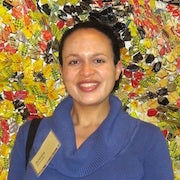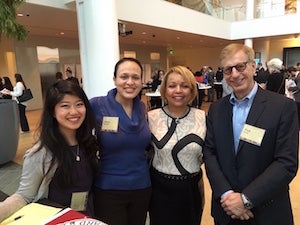According to the Harvard Impact Study, Harvard alumni collectively dedicate at least 1.6 million hours per month volunteering for public and community service efforts around the world. In celebration of these efforts, the Harvard Alumni Association (HAA) presents "Alumni Service Spotlight," a series of conversations with alumni who give of their time and talents for the betterment of their communities.
The Harvard Club of Seattle played matchmaker to more than 150 alumni and 40 nonprofit organizations gathered at the Bill & Melinda Gates Foundation for the Board and Skilled Volunteer Fair on March 14.
Hosted jointly with YaleSeattle, the fair provided a forum for civic-minded alumni to connect with one another and explore opportunities to get involved with local nonprofits dedicated to a range of issues—from food and housing insecurity, to environmental and human rights, to education and the arts. In addition to sponsorship support from the Gates Foundation, Social Venture Partners Seattle, and United Way of King County, the Club received logistical help from the HAA and Harvard's Center for Public Interest Careers, which have recently cosponsored similar events with the Harvard Clubs of New York City, Boston, and Chicago.
Feedback from participants in Seattle has been overwhelmingly positive, and the Club plans to make the fair an annual event—adding it to a broad portfolio of service initiatives that includes the Summer Community Service Fellowship, the Winter Mentorship Program, and the Early College Awareness program.
Alexis Wheeler JD '09, vice president of programs for the Club, reflected on the success of the Seattle fair and shared lessons learned for Clubs interested in hosting a fair in their city.
How did the idea for the fair take shape?
 Travis Lovett [director of the Center for Public Interest Careers] reached out to us and planted the seed in the autumn of 2015. Around the same time, YaleSeattle approached us about doing a community service survey, using our friendly rivalry to increase alumni participation with both clubs. Based on the results, we decided to team up and work on the fair together. Everybody brought great ideas to the table, and the HAA provided a toolkit that laid everything out for us, so we already had a blueprint. Through the Club's Winter Mentorship Program, we had strong community connections that helped us secure a venue and sponsors. It all came together, and we were able to pull off a great event.
Travis Lovett [director of the Center for Public Interest Careers] reached out to us and planted the seed in the autumn of 2015. Around the same time, YaleSeattle approached us about doing a community service survey, using our friendly rivalry to increase alumni participation with both clubs. Based on the results, we decided to team up and work on the fair together. Everybody brought great ideas to the table, and the HAA provided a toolkit that laid everything out for us, so we already had a blueprint. Through the Club's Winter Mentorship Program, we had strong community connections that helped us secure a venue and sponsors. It all came together, and we were able to pull off a great event.
Why was this a good fit for the Club and your members?
It aligns so well with our mission to advance educational and charitable purposes and, of course, to foster a sense of fraternity among Harvard alumni. Seattle has a reputation for having a cold shoulder—they call it the Seattle Freeze. A lot of our members, especially recent grads, are transplants who came here to work at Microsoft or Amazon, and it can be hard for them to break into the community and meet people. So alumni are looking for that Harvard connection. The fair was a great opportunity for our members to connect with each other and all these service organizations in a one-stop shop.
How did you decide which organizations to invite?
We focused mostly on the results of the community service survey that we sent out with YaleSeattle, which indicated that by far the top interest was education, followed by food insecurity, environmental protection, arts and music, homelessness, and human rights. We had about 170 nonprofits on our list, and we ultimately narrowed it down to 40. Pretty much every single one signed up as soon as they got the invitation. We never even got to anybody on the waiting list; hopefully next year we'll get to invite those other nonprofits.
What feedback have you heard from participants?
Most people were looking for an impactful opportunity, and they seemed pretty satisfied that they found it. We've had a lot of interest come out of the fair, and I think it will help us going forward. At most of our events, over 80 percent of attendees are either current or former members. But in this case, 50 percent had never been affiliated with the Club, so it attracted a different audience.
What advice would you give to other Harvard Clubs that want to host a similar event?
Start early: having nine months to plan definitely made a huge difference. Recruiting a great team and having them make a long-term commitment is also very useful; you don't want people falling out, and you don't want to be bringing people in at the last minute. Also, refer back to the HAA toolkit on a regular basis as a model you can pull from. Lastly, make sure you work your community connections and your alumni network. They will undoubtedly have good ideas, and they're the ones who will carry the fair forward in the future.
The Harvard Club of Seattle extends special thanks to Toni Hoover AB '81, AM '84, PhD '86, director of global health for the Bill & Melinda Gates Foundation; Lisa Nitze AB '82, former CEO of Social Venture Partners; and Liahann Bannerman AB '85, director of the Volunteer Center at United Way of King County, for their assistance in securing the venue and sponsorships for the fair. The Club also thanks planning committee members Abby Alt (Yale '99); Liahann Bannerman AB '85; Susanna Cerasuolo ALM '02; Kelly Charlton CSS '82; Bridget Cota (Yale MSN '09); Rick Davis MBA '80; C.C. Gong AB '15; Joseph Lachman (Yale '15); Susan Lieu AB '08 (Yale MBA '14); Emily Van Dyke AB '03, MPH '09; Alexis Wheeler JD '09; and Boting Zhang (Yale '03).
 Learn more about the Harvard Club of Seattle
Learn more about the Harvard Club of Seattle